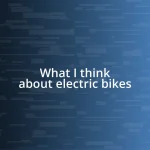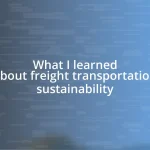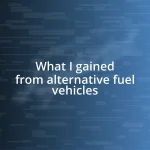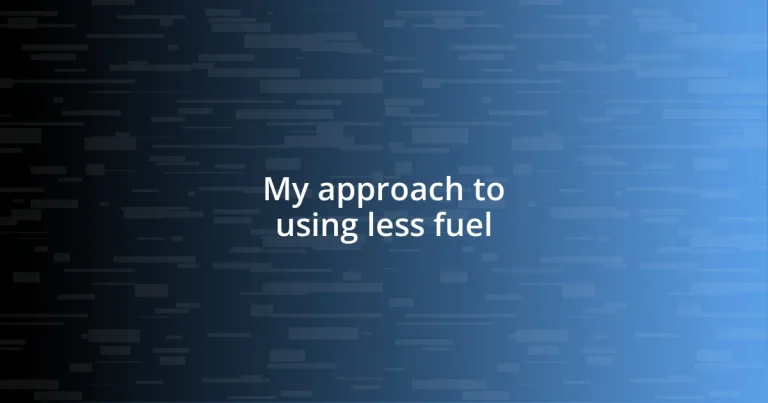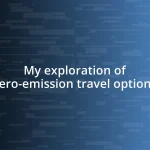Key takeaways:
- Understanding and adjusting driving habits, like maintaining steady speeds and limiting idling, can significantly improve fuel efficiency and reduce costs.
- Using less fuel benefits the environment by decreasing carbon emissions and can enhance social connections through practices like carpooling.
- Regular vehicle maintenance, such as checking tire pressure and oil changes, is crucial for maximizing performance and fuel economy.
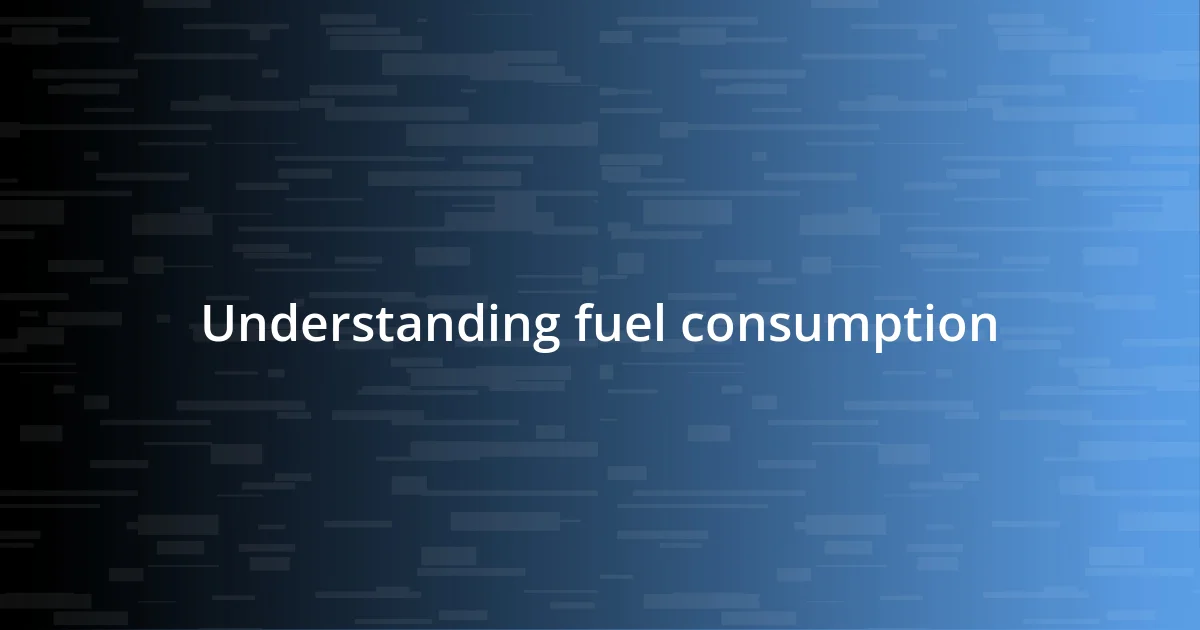
Understanding fuel consumption
Fuel consumption often feels like a mysterious force, doesn’t it? I can vividly recall the shock I felt the first time I tracked how much fuel my car actually used in a week. It made me realize that even simple changes in driving habits—like speeding or using air conditioning—could significantly affect my wallet and the environment.
When I first learned about fuel consumption, the numbers seemed abstract. But then, I discovered that driving just five miles per hour over the speed limit could drop my car’s efficiency by nearly 20%. I could hardly believe it! It was a little disappointing to see how my habits impacted my fuel efficiency. But understanding this concept allowed me to connect the dots between my driving style and the amount of money I spent at the gas station.
It’s fascinating how our daily choices shape our fuel consumption. Think about those short trips we often take—are they really necessary? I once tried walking to a nearby store instead of driving, and not only did I save on fuel, but I also enjoyed the fresh air and a bit of exercise. Having those small moments of realization helps you appreciate the broader implications of how we use fuel and encourages a more sustainable mindset.
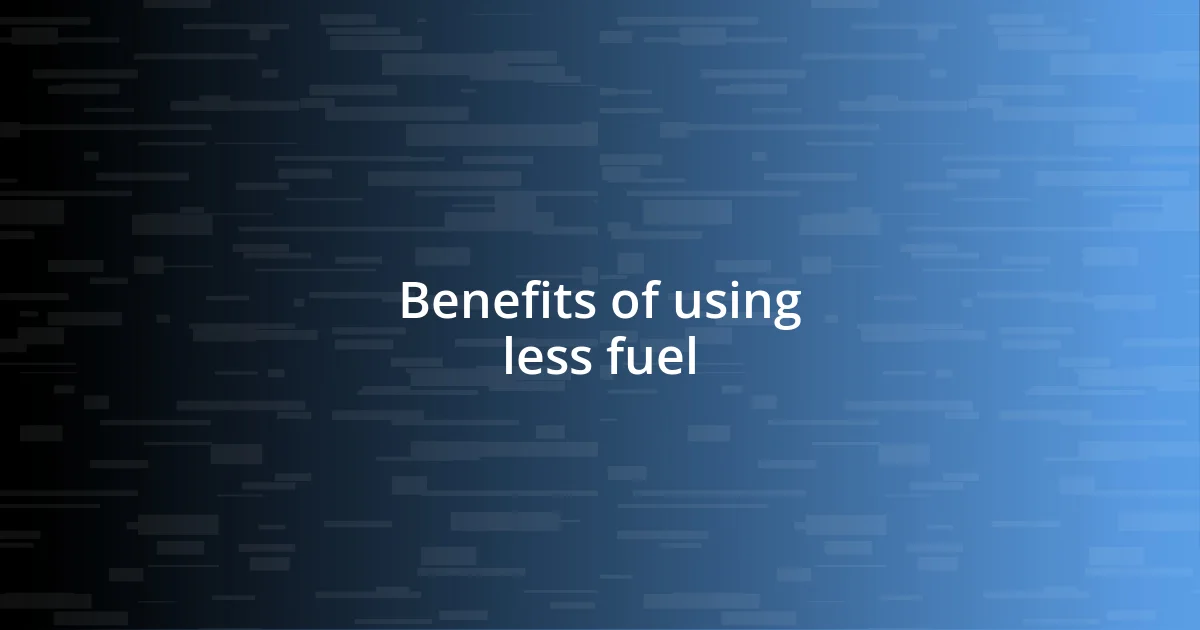
Benefits of using less fuel
Using less fuel has numerous benefits, both for our wallets and for the environment. Personally, I’ve felt an incredible sense of satisfaction knowing that by simply adopting smarter driving habits—like maintaining steady speeds and minimizing idling—I’ve cut down on fuel costs. It’s amazing how those seemingly small adjustments can lead to substantial savings over time.
Moreover, reducing fuel consumption plays a vital role in decreasing carbon emissions, which ultimately contributes to a healthier planet. I remember the first time I learned about carbon footprints. It was an eye-opener for me, realizing how my individual actions could either contribute to environmental damage or support sustainable practices. Taking proactive steps to lower my fuel usage felt empowering, as if I was actively participating in the fight against climate change.
Lastly, using less fuel can often lead to a more mindful approach to transportation. For example, I discovered that carpooling with friends not only helped save fuel, but it also created space for engaging conversations and shared experiences. These moments have enriched my relationships and made the journey itself more enjoyable, turning mundane commutes into opportunities for connection.
| Benefits | Description |
|---|---|
| Cost Savings | Less fuel consumption leads to lower expenses on gas. |
| Environmental Impact | Reduced fossil fuel usage contributes to a cleaner planet. |
| Social Connections | Sharing rides can foster relationships and create memorable experiences. |
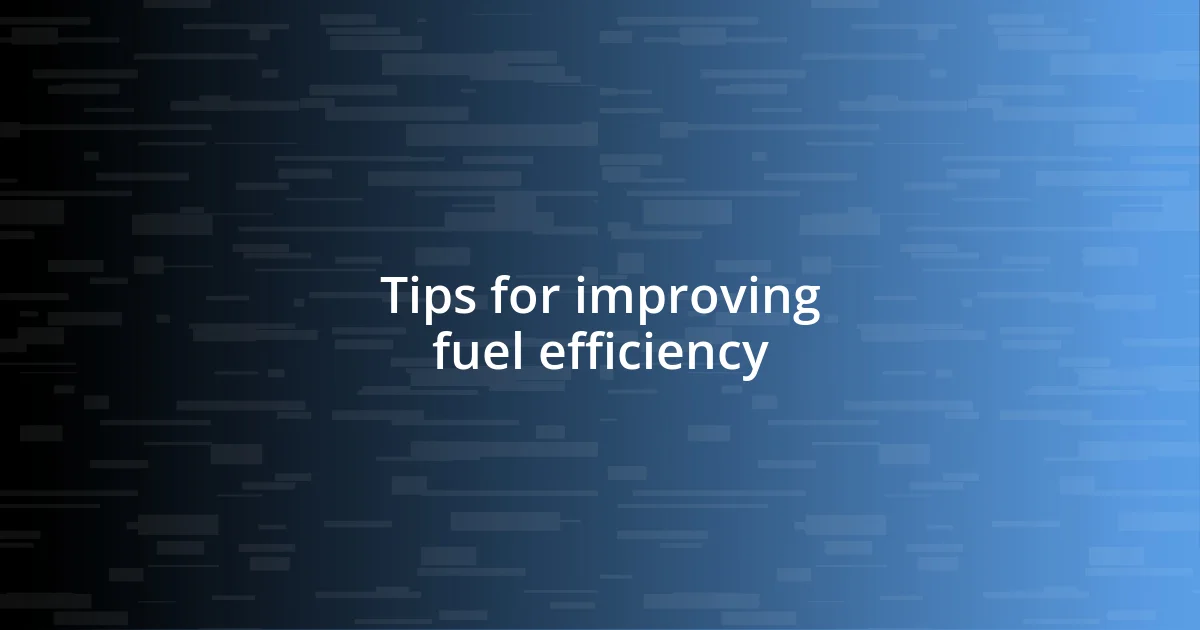
Tips for improving fuel efficiency
Improving fuel efficiency can feel like a puzzle, but I’ve found that simple tweaks to my driving habits yield significant results. One change that surprised me was when I decided to declutter my car; removing excess weight really helped enhance my fuel economy. It’s incredible how shedding a few pounds—like those old gym shoes in the trunk—can make a difference in how efficiently your car burns fuel.
Here are some practical tips that have worked for me to bolster fuel efficiency:
- Maintain proper tire pressure: Under-inflated tires can increase fuel consumption, so check your tire pressure regularly.
- Practice smooth acceleration: I’ve noticed that gradually pressing the accelerator not only keeps my ride comfortable but also conserves fuel.
- Limit air conditioning use: On cooler days, I prefer rolling down the windows instead; it’s refreshing and keeps my fuel usage down.
- Avoid unnecessary idling: If I’m waiting for someone, I turn off the engine. It’s a small habit that’s become second nature and saves gas.
- Plan routes wisely: I often map out my trips to avoid congested areas, realizing that fewer stops and starts lead to better fuel efficiency.
These little changes, while easy to overlook, can really pile up the savings and contribute to a more eco-friendly driving lifestyle.
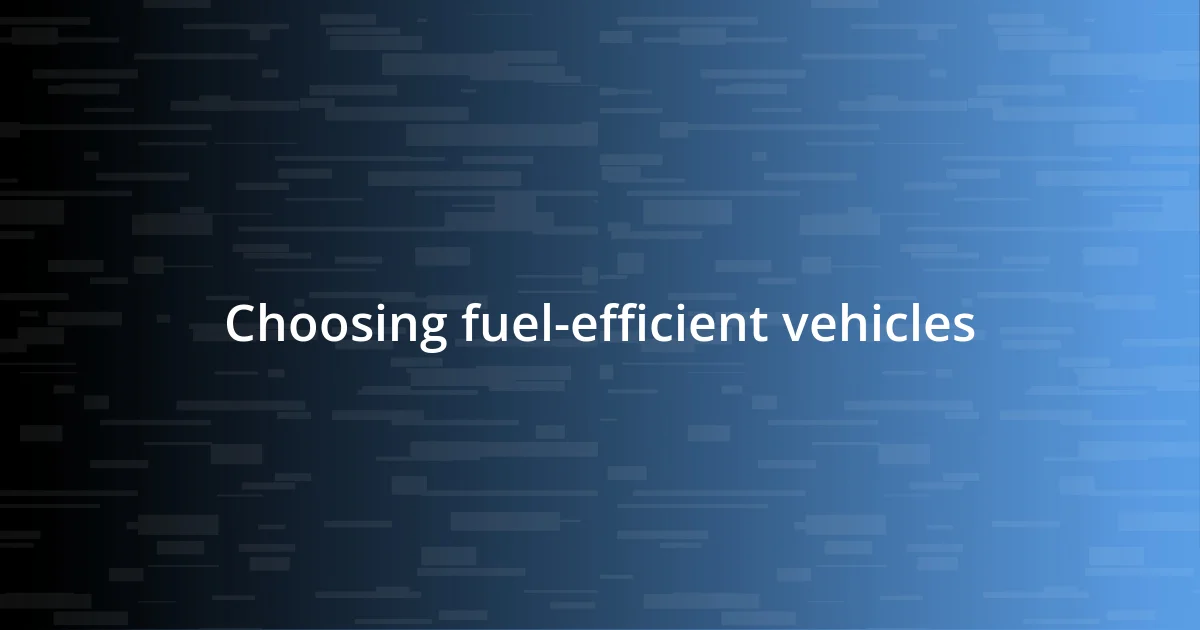
Choosing fuel-efficient vehicles
When it comes to choosing fuel-efficient vehicles, I’ve learned that a few key factors can have a major impact. For instance, I recently purchased a hybrid car, and the difference in fuel consumption has been striking. Not only does it save money at the pump, but I also find it rewarding to drive a vehicle that’s less taxing on the environment—every time I fill up, I feel a sense of accomplishment.
It’s essential to pay attention to the vehicle’s fuel economy ratings. I remember being amazed when I compared the MPG (miles per gallon) of various models. The frustration and confusion of researching options can feel daunting, but once I found a model that fits my lifestyle and offers great fuel efficiency, the search was well worth it. Have you ever found yourself overwhelmed by options? I sure have. But narrowing down choices based on efficiency made the process more manageable and ultimately more satisfying.
Don’t underestimate the importance of selecting a vehicle that suits your driving habits. For example, when I transitioned from a compact to a more spacious vehicle, I made sure to choose one that offered a balance of roominess and fuel efficiency. There’s nothing worse than overpaying for gas because you simply needed more cargo space. It makes me think: what do I really need from my vehicle? Identifying your priorities can take you a long way in making a choice that not only saves on fuel but also enhances your driving experience.
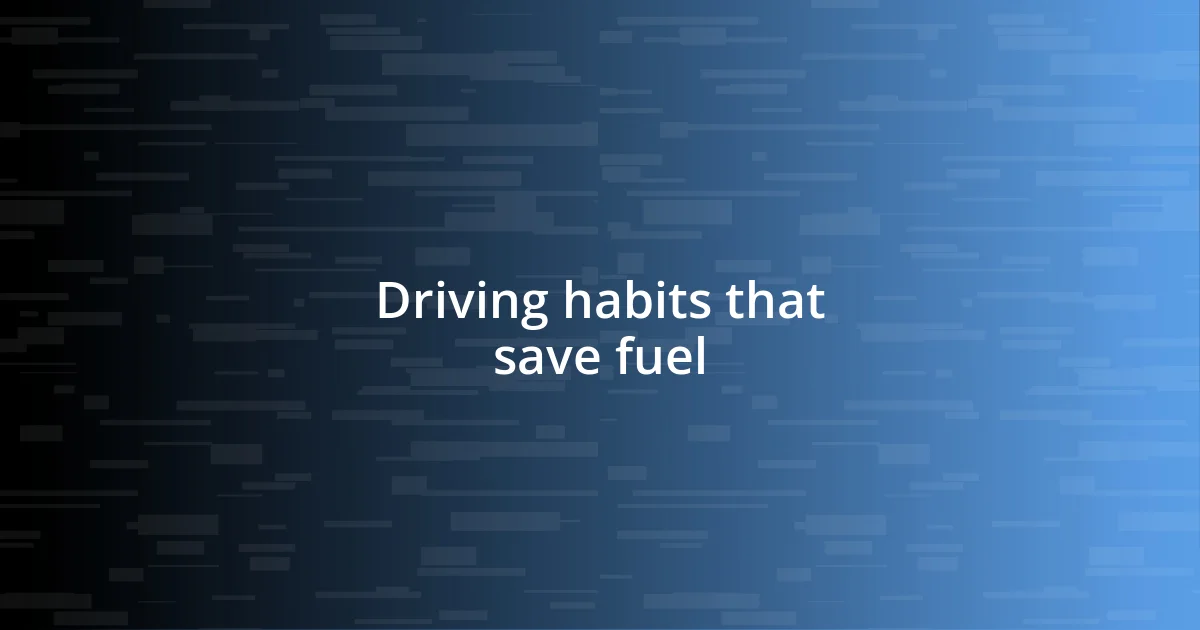
Driving habits that save fuel
It’s fascinating how small adjustments in driving habits can lead to significant fuel savings. One habit I’ve cultivated is to anticipate traffic flow. I find that by easing off the accelerator a bit sooner instead of rushing to the next traffic light, I can avoid sudden stops and starts, which not only saves fuel but also smooths out my ride. Have you noticed how often we drive on autopilot, only to end up wasting gas during those last-minute adjustments?
Another change I made was to limit my use of the “quick warm-up” routine after starting my car. I used to let my engine idle for a few minutes, thinking it was necessary. However, I learned that modern vehicles are designed to warm up much more efficiently when driving gently right away. It’s a mindset shift that feels freeing—now, instead of wasting fuel, I’m actually moving down the road and making progress.
Lastly, I’ve started shifting gears more efficiently in my manual car. I intentionally change gears early; it keeps the engine RPMs low, which, I’ve found, translates to less fuel consumption. Each time I consciously make that choice, I feel a little thrill—knowing I’m not just improving my driving skill, but also contributing to my fuel savings. It’s a wonderful feeling to recognize the direct reward of my actions. Have you tried experimenting with your shifting patterns? You might be pleasantly surprised at the outcome!
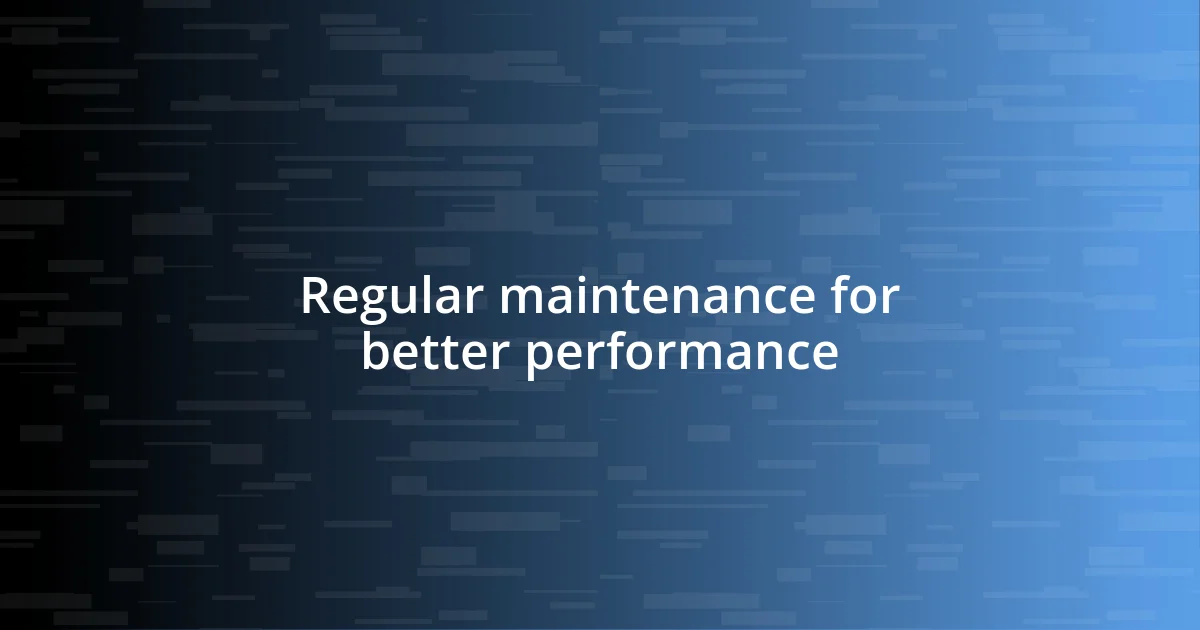
Regular maintenance for better performance
Regular maintenance plays a crucial role in maximizing a vehicle’s performance and, ultimately, its fuel efficiency. I remember the time I neglected to check the air filter in my car; it was so clogged that it restricted airflow, causing my engine to work harder and sip more fuel than necessary. Now, I set reminders in my calendar for regular checks, and it’s a game changer—my car runs smoother and, most importantly, I’m saving at the pump.
Tire pressure is another area where I’ve learned the hard way that neglecting maintenance can be costly. I once drove around with under-inflated tires without realizing how much extra fuel I was burning just to keep up with traffic. Now, I’m vigilant about the tire pressure, checking it regularly, and it really does make a noticeable difference—both in handling and in my monthly fuel expenses. If you haven’t yet made this a habit, I highly recommend it; your tires (and wallet) will thank you.
Finally, I’ve come to appreciate the importance of routine oil changes. When I first started driving, I used to go an embarrassing length of time without an oil change, thinking it was an area I could skimp on. But once I experienced the smoother performance of my engine after a fresh oil change, it became clear: clean oil helps keep everything running efficiently. Have you ever felt your car rev up like it’s thanking you after maintenance? It’s a small reminder that taking care of your vehicle is vital not just for performance, but also for your wallet in the long run.
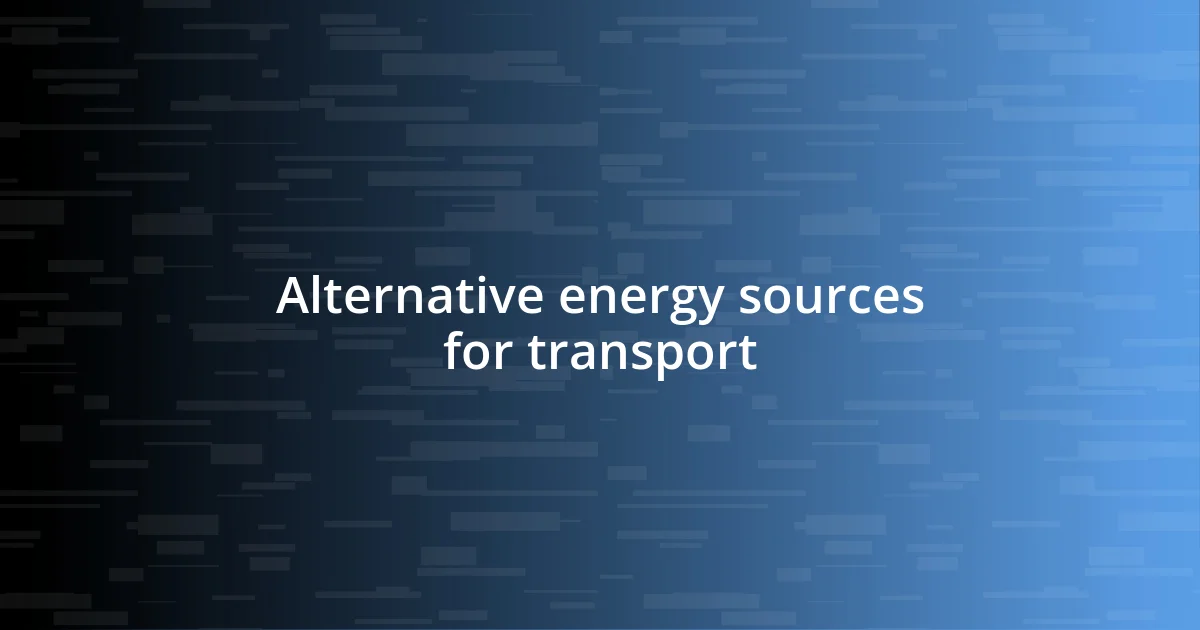
Alternative energy sources for transport
As I delved into alternative energy sources for transport, I was genuinely intrigued by the rise of electric vehicles (EVs). Transitioning to an EV was a significant change for me, but the moment I felt that instant torque, I understood the appeal. Have you ever experienced that rush when you press the accelerator? It’s a whole new driving experience! Plus, knowing that I’m reducing my carbon footprint is a powerful motivator. Charging my car at home feels like a little victory every day.
Then there’s the fascinating world of biofuels. I remember attending a local workshop where someone shared their homemade biodiesel journey. It amazed me how used cooking oil can be transformed into fuel! The idea of being able to take waste and turn it into something useful just resonates with my desire for sustainability. Have you ever considered where your fuel comes from? It really opened my eyes to the potential within our communities.
Hydrogen fuel cells also caught my attention. Initially, I was skeptical about their practicality, but after seeing a hydrogen-powered car in action, I was hooked. It’s remarkable how these vehicles emit only water vapor! Can you imagine a future where clean energy vehicles dominate the roads? I sincerely hope to see that shift grow, as it suggests a brighter path forward for transportation.


